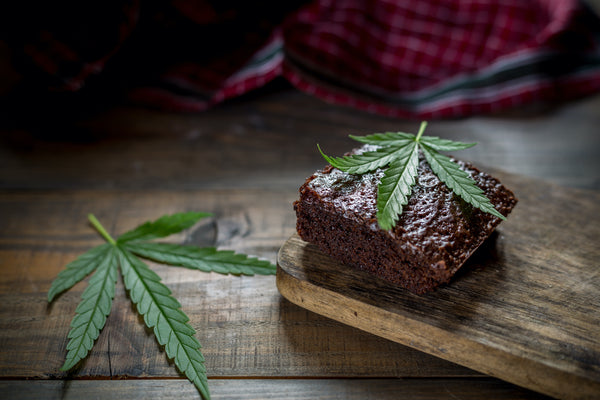Hemp is an incredible plant – we don't think there are many people left that can look you in the eye and deny that. Hemp has been used for thousands of years for everything from clothing and rope to fuel and medicine.
We are here today not to talk about hemp flower – but hemp flour!

What is Hemp Flour?
You may have heard of (or tried) hemp protein – a nutrient-packed plant-powered protein powder packed with all the amino acids and an abundance of healing phytonutrients; vitamins, minerals, and more. Well, hemp protein is similar to, but very different from hemp flour. We will discuss the key difference between the two in a moment.
First, we want to share how we create our hemp flour. We're very grateful to be able to keep this product in-house by growing all of our own hemp seeds - these hemp seeds are from plants with specially-chosen genetics that enhance the nutrient profile.
We cold-press our hemp seeds to extract the oils (if we didn't remove the oils from the hemp seeds, they would turn into hemp butter when milled - although some of the healthful hemp seed oil does remain behind and end up in the hemp flour).
After pressing the oil from the hemp seeds, what's left is known as a 'hemp cake.' This hemp cake is gently milled and turned into our heavenly, nutrient-dense hemp flour.
Hemp flour is:
-
100% Vegan/Vegetarian
-
100% Grain-Free
-
100% Gluten-Free
-
100% Dairy-Free
-
100% Paleo-Friendly
- 100% Keto-Friendly
How is hemp protein different from hemp flour?
The difference between hemp protein vs. hemp flour is truthfully very simple.
To create our hemp protein, we take our rich and thick hemp flour and slowly pass it through a micron filter to concentrate the protein molecules. This removes much of the fiber but greatly enhances the protein content.
At the end of the day, hemp protein and hemp flour are quite similar. Hemp flour will contain much more fiber, and lower amounts for protein - making it great as a baking substitute.
Hemp protein, on the other hand, will be finer and more suited for adding to post-workout protein shakes/smoothies, or simply taking straight for an anytime protein-boost.
Nutrient Density at its Finest: Hemp Flour
Hemp flour is rich in vital nutrients such as:
- Omega-3/Omega-6 essential fatty acids
- B vitamins
- Vitamin A
- Vitamin D
- Vitamin E
- Calcium
- Iron
- Zinc
- Phosphorous
- Copper
- Potassium
- Sulfur
- Fiber (60%+ soluble/40% insoluble)
- Magnesium
- Manganese
- Lignanamides (fascinating molecules that promote overall health)
- 20 Amino Acids (including all nine essentials)
What's exciting is how many of the nutrients found in high levels in hemp flour is that many of them often top the lists of the vitamins and minerals in which people tend to be most deficient.
Take magnesium, for example - experts estimate that as much as 75% of Americans do not meet the recommended daily allowance (RDA) for this all-important nutrient dubbed the 'relaxation mineral.' Magnesium is utilized by the body in hundreds of processes and is exceedingly hard to get from the diet.
Hemp flour just happens to be one of the most magnesium-rich food sources known. Just three tablespoons of hemp seeds can supply up to 50% of your RDA for magnesium.
Zinc is another great example of how hemp is healthy. Zinc has been shown to support the immune system in a variety of studies. Additional research suggests as much as 40% of the elderly lack this critical micronutrient. Three tablespoons of hemp seeds contain as much as 31-43% of your RDA for zinc (respectively for male or female).

One of the most remarkable benefits of hemp flour comes from its fiber content. At over 60% soluble fiber, it's near the threshold of what can be officially dubbed a 'prebiotic.' Soluble fiber turns into a nourishing gel in the gut that promotes a healthy microbiome, as this special gel acts as food for good bacteria.
And then, of course, phosphorous, magnesium, and calcium are the mighty trio for dental health. Without the right balance of all three of these minerals, optimum enamel strength cannot be achieved. Hemp fibers are very durable, so it makes sense that eating it might transfer some of this structural strength to our bodies.
It's also exceptional for a plant-protein to be complete - quinoa is one of the only other examples. By weight, hemp seeds offer about as much protein as lamb or beef.
Continuing the awesomeness, hemp flour provides a hefty dose of the essential fatty acids ALA and LA (omega-3 and omega-6) in their ideal 1:3 ratio for optimum health. Not only are essential fatty acids more lacking in our modern diets, but finding them together in this perfect ratio is unheard of anywhere but with hemp foods.
Hemp flour also contains a healthful fatty acid called Gamma-Linoleic Acid (GLA) that many people take for a variety of health issues (GLA supplements are usually made from Evening Primrose Oil). Also present is Stearidonic Acid which is important for boosting levels of DHA - a crucial brain and nervous system building block.
How to Use Hemp Flour

While hemp flour does not rise and therefore is not a total replacement for all baking flours, we recommend experimenting with various ratios of hemp flour to regular flour in your home-cooked creations. Adding hemp flour to your regular recipe will essentially turn any plain baked good into a healing superfood.
We recommend about 25% hemp flour in the place of any other baking flour in your recipe, although this is a mere guideline - not a strict protocol. A 3:1 ratio of regular flour to hemp flour will create a dense and hearty loaf, while a 7:1 ratio would result in a mostly normal roll but with flecks of life-giving hemp.
White flour (often enriched and bleached, not the greatest things for health) remains the most common flour in our food supply, and thus is hard to avoid. However, we encourage experimenting with more healthful flours like almond, coconut, or oat.
Wheat flour can also be very good for you, especially when using flour from heirloom varieties such as Einkorn, spelt, rye, and hard winter wheat. Like anything in life, you'll have to play around a bit and see what works best for you.
Generally speaking, hemp flour has an earthy, nutty flavor, and imparts a delightfully dense and granular texture - much like cornflour (any cornflour tortilla fans here?).
For those people with allergies and sensitivities, how often do you come across a baking flour that is grain-free, gluten-free, and dairy-free? We feel that hemp flour can be ideal for:
- Athletes
- Bodybuilders
- People with gluten intolerance or Celiac
- Expectant Mothers
- Children
- Vegans/Vegetarians
- Anyone and everyone
Many people are forced to resort to strict diets for various reasons, and this can sadly eliminate many dietary favorites. However, using hemp flour means you can have your cake and eat it too. Don't cut out your favorite brownie recipe because it's 'unhealthy.' Instead, upgrade that old cookbook recipe to use a bit of hemp flour and see how good it makes you feel.
The result will be getting to keep the enjoyment of your favorite late-night chocolate indulgence, while also benefiting from a ridiculous amount of healthful nutrition. It may sound like a joke or a smoked-out sales pitch, but it's merely the joy and healing that hemp has been waiting so long to share with us.
Will Hemp Flour Get You High?
Without a doubt, hemp flour will not get you high. The levels of active cannabinoids in any hemp foods are exceedingly low, and the amount of hemp flour you would need to consume to get any substantial dosage would likely be more than your body weight.
So rest easy, while any brownies you make with our hemp flour will certainly be special, they won't be 'special' if you catch our drift.

